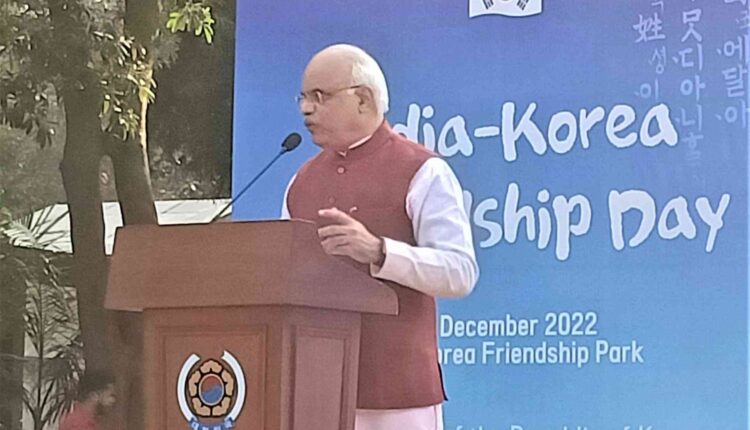Koreans are our damaad, son-in-laws, kind of: Vinay Sahasrabuddhe, ICCR President
He said since an Indian princess Suriranta had married a Korean king Kim Suro 2000 years before, Koreans are kind of India's damaad, son-in-laws.
NEW DELHI: Dr. Vinay Sahasrabuddhe, President of Indian Council for Cultural Relations (ICCR), and former parliamentarian has termed South Koreans as India’s Damaad – Son-in-laws. He said this while referring to a 13th-century Korean chronicle Samguk Yusa’s legendary story of an Indian princess getting married to a Korean king in 48AD.
Some 2000 years ago, princess Suriratna from Ayodhaya (India) became the wife of King Suro of Geumgwan Gaya at the age of 16, after having arrived by boat, and was known as Heo Hwang-ok.
“Korea for us is not a neighbouring country strictly speaking. But I think, it’s beyond a neighbouring country in every sense of the term. In India, we treat the son-in-laws with all reverence and since our Indian princess had married with a Korean king, I believe Koreans are our damaad, they are our son-in-laws kind of. I mean that kind of love and affection we have,” said Dr. Sahasrabuddhe during India-Korea Friendship Day event at the Indo-Korean Friendship park in New Delhi. The India-Republic of Korea Friendship Society headed by former Ambassador to Korea Skand R Tayal organised the event.
Chang Jae-bok, South Korean Ambassador to India who unveiled a special commemorative 50th anniversary logo India South Korean diplomatic relations was also present on the occasion on this occasion.
“As we all know our cultural links are rooted deep and strong, the ICCR has been working to further explore the belief about the princess of Ayodhaya who had travelled by the sea route to the ancient Gaya kingdom and med the King Kim Suro in the 48th year of the current era,” the ICCR president added.
As part of the Indian ministry of external affairs, the ICCR aims to actively participate in the formulation and implementation of policies and programmes pertaining to India’s external cultural relations; to foster and strengthen cultural relations and mutual understanding between India and other countries; to promote cultural exchanges with other countries and people, and to develop relations with nations.
In his address, Dr. Sahasrabuddhe who was the National Vice President of the ruling Bharatiya Janata Party (BJP) during 2014-2020, vowed to further enhance relationship between India and South Korea.
He said, “Under the dynamic leadership of Prime Minister Narendra Modi the India-ROK relationship is acquiring many more dimensions. I can see many people from business, trade and industry here, and that is growing. Relationships require investment but not just resource investment but also perhaps knowledge investment that gets translated into some kind an emotional investment also”.
“I may propose, in the 50th year of India-ROK Friendship, if we can take this relationship to a different level, especially about the literacy about Korea in India, and the literacy about India in Korea requires to be further level enhance at the popular level. While Indians know K –pop is extremely popular here in India as well. But beyond all such things, if we can really acquire some knowledge dimension to the relationship, we can have some Korean Week observed in Indian libraries, and similarly, we can observe Indian week in Korean libraries, also we can have many more programmes involving some students and teachers as well with some kind of understanding between major universities in India and Korea. I am sure we can take this relationship to a much higher level,” he added.
Though the bilateral consular relations between India and South Korea were established in 1962 but were upgraded to Ambassador-level on 10th December in 1973, thus completing 50 years in 2023. Therefore, a series of events are being organisned next year to commemorate this year as the 50th anniversary of the establishment of diplomatic relations between the two countries.



